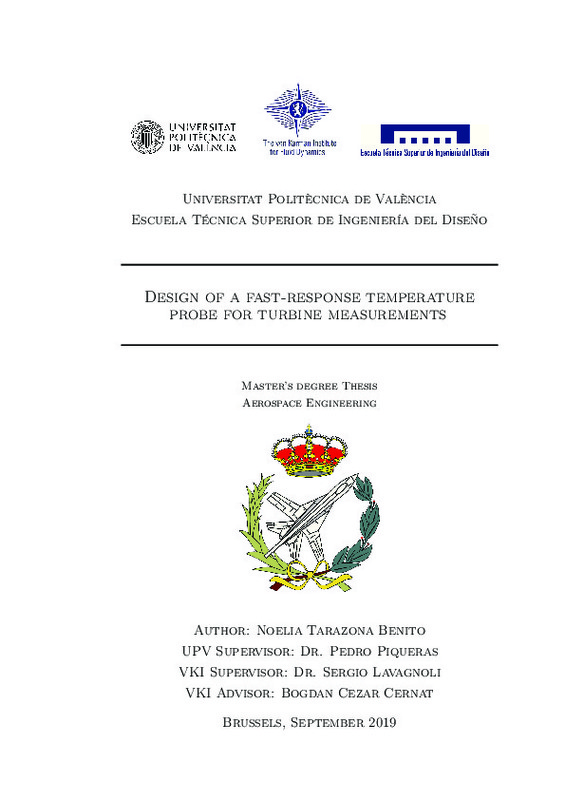|
[ES] El aumento del tráfico aéreo conlleva la continua búsqueda de mejoras en
la eficiencia de los motores. Dicha eficiencia está directamente relacionada con
la temperatura máxima que se puede alcanzar en el proceso de ...[+]
[ES] El aumento del tráfico aéreo conlleva la continua búsqueda de mejoras en
la eficiencia de los motores. Dicha eficiencia está directamente relacionada con
la temperatura máxima que se puede alcanzar en el proceso de combustión y,
por tanto, la temperatura de entrada en la turbina. Las elevadas temperaturas
alcanzadas pueden provocar daños en los distintos componentes, de ahí
la importancia de la caracterización del flujo en la primera etapa de la turbina
de alta presión.
En el instituto de investigación von Karman Institute for Fluid Dynamics
cuentan con instalaciones que simulan dicha etapa, el VKI CT3 ring. Esta
instalación permite reproducir en términos de números de Mach y Reynolds
el flujo existente en una etapa de una turbina de alta presión de un motor de
aviación moderno.
El principal objetivo de esta tesis es el diseño de una sonda capaz de medir
la temperatura y sus fluctuaciones asociadas al paso de los álabes en las instalaciones
antes descritas para poder llevar a cabo la caracterización del flujo y los
distintos fenómenos presentes durante esta etapa. Debido al elevado número
de álabes y revoluciones, la respuesta de frecuencia requerida es del orden de
25-50kHz.
Tras el estudio de las sondas ya fabricadas y distintos prototipos diseñados
se procede con el diseño del prototipo final intentando satisfacer las necesidades
establecidas. El diseño completo comprende desde el estudio inicial de dimensionado
hasta la configuración de los sensores y análisis del comportamiento
térmico de la sonda.
La solución final obtenida es un equilibrio entre todos los parámetros y
necesidades. Dicha configuración permite la caracterización de la temperatura
del flujo en CT3 con un número limitado de medidas. La futura fabricación
de la sonda se realizará en los laboratorios del propio instituto.
[-]
[EN] The increase in air traffic entails the continuous search for improvements
in engine efficiency. This efficiency is directly related to the maximum temperature
that can be reached in the combustion process and, ...[+]
[EN] The increase in air traffic entails the continuous search for improvements
in engine efficiency. This efficiency is directly related to the maximum temperature
that can be reached in the combustion process and, therefore, the
turbine inlet temperature. The high temperatures reached can cause damage
to the different components, hence the importance of the flow characterization
in the first stage of the high pressure turbine.
The von Karman Institute for Fluid Dynamics has facilities that simulate
this stage, the VKI CT3 ring. This installation allows to reproduce in terms
of Mach and Reynolds numbers the flow existing in a stage of a high-pressure
turbine of a modern aviation engine.
The main objective of this thesis is the design of a probe capable of measuring
the temperature and its fluctuations associated with the passage of the
blades in the facilities described above to be able to carry out the characterization
of the flow and the different phenomena present during this stage. Due
to the high number of blades and revolutions, the required frequency response
is of the order of 25-50kHz.
After the study of the probes already manufactured and different prototypes
designed, the final prototype is designed to meet the established needs.
The complete design includes from the initial sizing study to the configuration
of the sensors and analysis of the thermal behavior of the probe.
The final solution is a balance between all parameters and needs. This
configuration allows the characterization of the flow temperature in CT3 with
a limited number of measurements. The future manufacturing of the probe
will be carried out in the laboratories of the institute itself.
[-]
|







